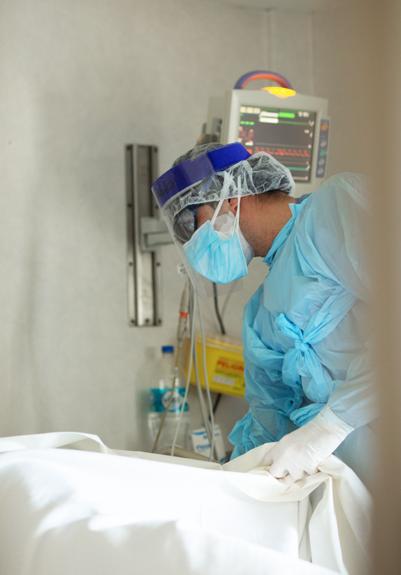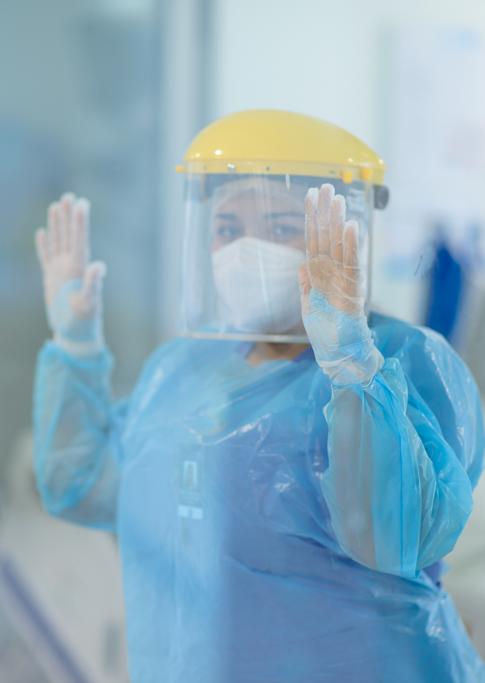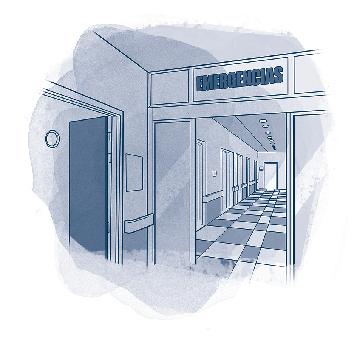
6 minute read
Being surrounded by death makes you value life more
Unprecedented tsunami
sergio castaño Nurse Sanitas Hospital La Moraleja
«I haven’t had any rest. I couldn’t, because we had to look after others and forget about ourselves. We doubled up shifts and were at the hospital all day. You had to be really aware of what was going on, because it was all new, and there was new protocol the whole time. Once things were brought under control it was all different, but at the beginning we had no idea what was going on. It hit us like a tsunami - we had no idea of what had hit us. From the first moment we would say: We are not heroes, or martyrs, not at all. I didn’t study nursing to be in a war, but to be in a hospital, helping people».
We are not heroes, we are committed professionals
donna ritchie Lead Manager Sanitas Healthcare Funding
The different sectors of Sanitas work together really well, and that has helped us give the very best care during the pandemic, as we have been able to take advantage of the organisation’s excellent infrastructure. I, along with many colleagues have been released from our usual functions to provide support where it was most needed, which is normally in hospitals or care homes. We have four hospitals, three in Madrid and one in Barcelona, as well as forty-seven care homes throughout Spain.
I think we have been through three very different periods. The first was at the start of March, which was the period of incredulity. Then, in April, when Spain experienced the peak, we were doing everything we could to cope with it. And the third was when the cases started to fall and the pressure eased off a bit.
The care homes are full of older people who often have underlying illnesses, which unfortunately makes them more susceptible to getting seriously ill with Covid. When cases of the virus increased in Spain, the decision was made to close the care homes to visitors. The residents were isolated in their rooms and were tested. I had the opportunity to lend a hand at one of our homes. In spite of such a difficult situation, my experience at the home was a positive one. There was a great atmosphere, the residents were very well cared for and we had a lot of fun. In Sanitas, there has been a focus on digitalization for a long time now. When the pandemic came and people had to quarantine we were prepared with a video consultation platform and so we were able to to provide online appointments with over three thousand doctors. Our patients have been able to attend medical consultations from their own homes. As part of our service, Sanitas has an urgent care phone support system. Due to the pandemic, the demand for this service has increased significantly and my colleagues and I have been supporting the team. I attended customers with many different health problems, all affected by the pandemic in one way or another, and some of them in very difficult situations. I am privileged to have had that experience, and the opportunity to help.
The pandemic has brought us many challenges and in order to help us cope, Sanitas offers a psychological support service to its healthcare staff, who are the “indirect victims” of this pandemic. We are not heroes, we are committed professionals, trained for this. One of Bupa’s core values is courage, and there has been plenty of this. We have been able to support each other, but above all we have been able to give the best possible service to our customers, patients and residents who are, at the end of the day, our reason for being. �

Today we value our team and apreciate life more
mª gloria marinas Nurse Sanitas Hospital La Zarzuela
I have been a nurse at La Zarzuela Hospital for twenty years. Our focus at the beginning was to treat the largest number of patients possible, and to do that we increased our number of ICU beds by almost threefold. We even set up a field hospital so we would have the extra space if we needed it. We also worked with the public health service to treat more patients. I think we have done a really good job both in terms of the hospital itself and its employees. Patients would come in with underlying conditions and a very poor prognosis. Health recommendations were that we should not allow any visitors, in order to avoid community transmission. It was an ethical dilemma, because a dying person is normally surrounded by their loved ones.
The emergency room was the place where patients had to say their goodbyes, face the fact they knew they would not make it and would probably not see their families again. I remember when I had to look after someone who was at the end, because they had a serious underlying illness. He was pretty young, in his fifties. His wife could only have a few moments to say goodbye from behind a screen, because visitors were not allowed in the rooms at any time. It was sad to think that this was the last time this couple would see each other. I tried to lighten the situation a bit for the few moments I was there. Then I had to just get on with things. It was also very stressful changing into full protective equipment each time I went into a different cubicle. This change in working practices made it very hard for us. As well as the technical challenge, being dressed in an overall, mask and screen and then to have to take them all off just as quickly made us anxious. It is hard knowing you are at risk the whole time. All of it made us very tired. There were days I would get home and it would make me cry to speak with someone who could actually hear me properly. I think I needed to offload all that anxiety and pain I had been through. You have a lot of pent-up tension, especially because you are worried about your own family. I myself have two children, a girl of 14 and a boy of 11. The first days of the pandemic I would get home really frightened of infecting them. Thank God, that did not happen. My children have really helped me through this. They would say: Mama, don’t worry, if you can get through this, we all can. Give us kisses and hugs. They needed those, because their routine and their way of life had also changed radically from one day to another. I know it’s been hard for my son not being able to see his friends like he used to when he went to school, as he relied on his friends for a lot of things. My daughter, being that bit older, has managed her frustration better. We are all having a hard time and we need to stick together.
All of it made us very tired. I think this disease has come to stay. It’s really difficult to stop it There were days I would get completely, but I know they are working on a vaccine, which is key for home and it would make me the most vulnerable people. We have managed to slow the spread of the pandemic by using masks and washing our hands. I think with winter cry to speak with someone coming it’s going to get difficult again, because October and November who could actually hear me are the months when respiratory diseases usually spread. Respiratory problems will increase and there will be more fevers, and we will have to properly. I think I needed to work out whether it’s Covid or the cold virus. offload all that anxiety and Of course, we are worried about the situation getting really bad pain I had been through. again, but we know so much more now and we are stronger. Now we value our team and appreciate life. �
MADRID — SPAIN











